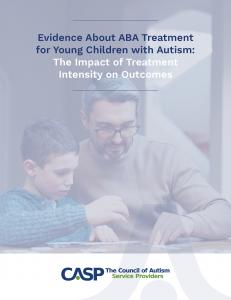Paper Establishes Connection Between Treatment Intensity and Outcomes
Our paper highlights the critical importance of treatment intensity to outcomes and provides benchmarks to use in evaluating ABA treatment outcomes delivered to young autistic children”
— Lorri Unumb, CEO of CASP
BOSTON, MA, UNITED STATES, April 4, 2025 /EINPresswire.com/ -- The Council of Autism Service Providers (CASP) has released a new paper demonstrating the connection between applied behavior analysis (ABA) treatment intensity and young autistic children’s outcomes.
ABA is the most effective treatment
The new paper from CASP summarizes evidence about early, comprehensive, intensive ABA treatment. “Intensity” refers to the number of hours per week that a child receives ABA. Low intensity is 5 to 12 hours; intermediate intensity is 13 to 25 hours; and high intensity is 26 to 40 hours.
What CASP found in reviewing decades of data is that young children with autism benefit significantly more from high-intensity ABA than low/intermediate intensities or other forms of treatment.
Dr. Jane Howard (senior advisor to BlueSpring) and Dr. Linda LeBlanc (executive director of the Action Institute for Outcomes Research) led the team of expert researchers and clinicians who produced the report.
“The conclusions couldn’t be clearer,” said Dr. Howard. “The more hours of quality ABA a child receives in their earliest years of life, the better their outcomes are going to be.”
Evidence About ABA Treatment for Young Children with Autism addresses a new meta-analysis of treatment outcomes by Dr. Sigmund Eldevik and his colleagues. It also examines studies in which authors claim that high and low treatment intensities produce similar outcomes. The paper provides context to the studies’ claims, raising concerns about their methodology, design, and understanding of early intensive intervention.
“Our paper highlights the critical importance of treatment intensity to outcomes and provides benchmarks to use in evaluating ABA treatment outcomes delivered to young autistic children,” said Lorri Unumb, CEO of CASP. “Parents deserve to have the facts to be able to make an informed decision about their child’s care. Because the choices they make now will have long-ranging consequences.”
Click here to read the paper.




No comments:
Post a Comment